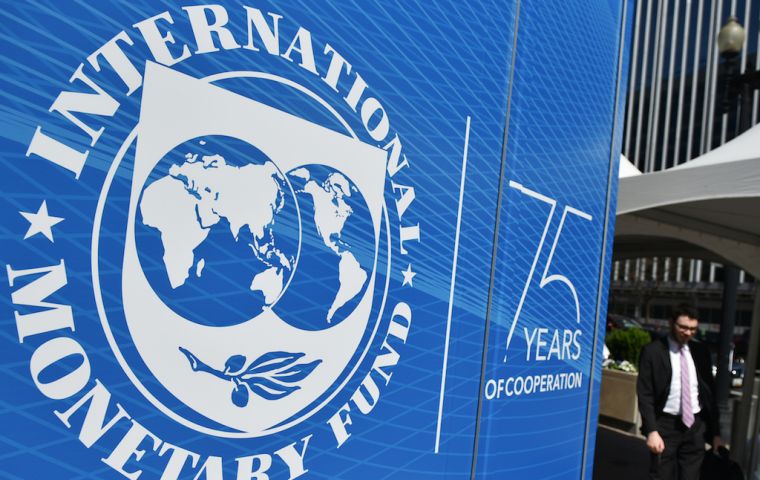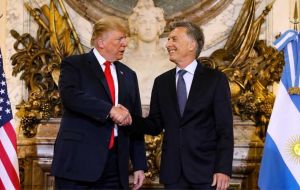MercoPress. South Atlantic News Agency
The IMF after Argentina
 IMF staff know very well that countries with a history of serial default, such as Argentina and Venezuela, ride a slippery slope in debt markets
IMF staff know very well that countries with a history of serial default, such as Argentina and Venezuela, ride a slippery slope in debt markets  There is a case to be made that by pushing the IMF to go easy in its loan program, President Trump’s administration made Argentina’s latest economic calamity worse
There is a case to be made that by pushing the IMF to go easy in its loan program, President Trump’s administration made Argentina’s latest economic calamity worse  When Miguel Savastano, Carmen Reinhart, and I studied this phenomenon many years ago, we called it “debt intolerance.”
When Miguel Savastano, Carmen Reinhart, and I studied this phenomenon many years ago, we called it “debt intolerance.” By Kenneth Rogoff (*) - It’s high time to ask how to refocus the International Monetary Fund’s mandate for dealing with emerging-market debt crises. How can the IMF be effective in helping countries regain access to private credit markets when any attempt to close unsustainable budget deficits is labeled austerity?
In case you blinked, the Argentine government built up a pile of debt out of almost nothing with surprising speed, and then proceeded to default on it almost as quickly. Compared to the country’s slow-motion 2002 default, the latest crisis feels like 60-second Shakespeare. But in both cases, default was inevitable, because the country’s mix of debt, deficits, and monetary policy was unsustainable, and the political class was unable to make the necessary adjustments in time.
And in both cases, loans from the International Monetary Fund seemed only to postpone the inevitable, and, worse, to exacerbate the ultimate collapse. So, after the second debacle in Argentina in less than a generation, it’s high time to ask how to refocus the IMF’s mandate for dealing with emerging-market debt crises. How can the IMF be effective in helping countries regain access to private credit markets when any attempt to close unsustainable budget deficits is labeled austerity? The only answer is to increase substantially the resources of international aid agencies (the IMF is a lender). Unfortunately, there seems little appetite for that.
Why was the IMF willing to pour resources into a situation that – at least with the benefit of hindsight – could be resolved only through stronger fiscal adjustment (more austerity), a debt default, more foreign aid, or a mixture of all three?
The IMF’s difficulty in saying no to Argentina partly reflects an acrimonious history stemming from the failed loans from the late 1990s through 2001. It was also hard for the Fund to resist funding a big program in a world where countries can borrow at ultra-low interest rates from private markets. (China, too, has become a major source of funding in emerging markets, which might sound good in the abstract, but the lack of transparency makes Chinese loans fertile ground for corruption.)
But IMF staff know very well that countries with a history of serial default, such as Argentina and Venezuela, ride a slippery slope in debt markets. When Miguel Savastano, Carmen Reinhart, and I studied this phenomenon many years ago, we called it “debt intolerance.”
There is a case to be made that by pushing the IMF to go easy in its loan program, US President Donald Trump’s administration made Argentina’s latest economic calamity worse. After all, Argentine President Mauricio Macri’s father was a business partner and friend of Trump. But, whatever the truth of that argument, the Fund’s ever-weaker bargaining position probably has deeper roots.
Political support for necessary loan conditionality has been eroded by repeated attacks from the left, which does not accept that the IMF does not have scope to give outright grants. But while NGOs might cheer if the IMF were to convert its loans to grants, pretty soon the Fund’s coffers would be bare. This, too, might make some people happy, but it would be a disaster for global financial stability. Debt in many emerging markets today is at record levels, and the IMF remains the closest thing there is to a global lender of last resort. For all its limitations, the Fund has greater competency than any other organization to mitigate the costs of emerging-market debt crises, not least to the general population.
But the goal must be to prevent such crises from occurring – or recurring, as in Argentina’s case. Macri was elected in 2015 by a populace that had grown weary of the slow growth and high inflation that marked the last few years of former President Cristina Kirchner’s administration. Kirchner’s policies (and those of her husband, Néstor Kirchner, who preceded her) sharply expanded state intervention and control. Booming commodity export prices allowed the economy to continue growing, but when the cycle turned, it all fell apart.
Still, Macri inherited an economy where debt was not high (owing to the 2002 default), and the main fiscal problem was an unsustainable pension system. The normal prescription for an incoming administration would have been to take the pain of budget consolidation early on, and hope that the economy recovers well in advance of the next election. Instead, Macri decided to close the budget gap slowly, and use his political honeymoon to cut taxes and liberalize markets. Unfortunately, after Big Bang reforms, economic conditions tend to get worse before they get better, and it appears that Macri, facing an election later this month, will not be around to see that. Things have gotten so bad that Argentina has “reprofiled” (a form of default) even domestic-currency debt (which is more common than most people realize, as Reinhart and I showed in our 2009 book). It is a sad state of affairs.
It also demands an answer to a fundamental question: How can the IMF reconcile the need for a credible regime in which emerging markets can conduct necessary borrowing with demands for more aid and less austerity?
The short answer is that the IMF cannot do it alone. The only way to square the circle is with a huge increase in aid flows. But don’t expect either a Democratic or a Republican US administration to lead the charge. In the meantime, politicians should let the IMF do its job – helping to maintain global financial stability – and not force it to back unsustainable policy regimes.
(*) Kenneth Rogoff, Professor of Economics and Public Policy at Harvard University and recipient of the 2011 Deutsche Bank Prize in Financial Economics, was the chief economist of the International Monetary Fund from 2001 to 2003. The co-author of This Time is Different: Eight Centuries of Financial Folly, his new book, The Curse of Cash, was released in August 2016.




Top Comments
Disclaimer & comment rules-

-

-

Read all commentsREF: “IMF after Argentina”:
Oct 07th, 2019 - 10:28 am 0They will owe so much money to the IMF that Argentina can claim that they own IMF! That's the Best-Case Scenario!
Not complicated at all, eh , Kamerad/Komrade Rique?
Oct 08th, 2019 - 10:21 am 0https://oi1290.photobucket.com/albums/b521/imoyaro/votekameradrique_zpsalzeh2tj.jpg?t=1570441352
The explanation need not be complicated. The U.S. wanted badly Macri to win a second term, and pushed the IMF to loan money to Argentina in spite of all the warnings detailed in the story above, with the complacence of Christine Lagarde.
Oct 04th, 2019 - 04:24 pm -2As a result, the upcoming government will have a good case to claim the IMF's co-responsibility for lending huge amounts of money to a government that had already shown total irresponsibility in managing Argentina, and worse still, managing the large amounts it borrowed, first from private lenders, and then from the IMF.
Commenting for this story is now closed.
If you have a Facebook account, become a fan and comment on our Facebook Page!